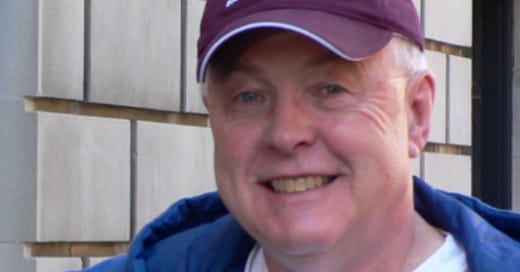A Tribute to Don Tack Part 1
Don Tack, the person whom I’ve admired more than anyone during my lifetime entered the presence of Jesus on December 10th, 2023. If there was someone I wanted to be like besides Jesus, it was Don Tack. I knew him as a Servant Leader, Mentor, Boss, Pastor, Teacher/Professor, Street Minister to the mentally ill homeless and the poor, Equipper of poverty ministry among evangelical Churches, Radical, Defender of the Fundamentals of the Faith, and Social Justice Apologist. I met him at one of the most pivotal junctures of my life when I had not gained a solid footing in my faith in Jesus and my theological convictions.
Thirty-four years ago, I moved into a slum apartment above the storefront Baptist church plant on the west side of GR, where I had been serving, mainly ministering to alcoholics and drug addicts who drifted in and out of homelessness. At the same time, the toxic leadership of the pastor who started the church and his cultural detachment from the urban poor in the community had left me disillusioned with fundamentalist Christianity. In my missionary readings from college and seminary classes, I discovered urban ministry practitioners with fruitful, flourishing ministries, such as John Perkins and Ray Bakke. However, the church plant I was helping had nothing in common with them. So I began exploring other stripes of Christianity that claimed to have a heart for the poor, attending mega-churches, Vineyard churches, and even a few liberal ones. I was also wrestling with liberation theology, socialism, and racial justice, especially in light of the 1992 LA Riots. My readings and interactions with social workers, educators, and other fellow poverty fighters exposed me to many different secular ideologies. In other words, I was teetering on deconstructing my theology and faith. However, I was too frightened to let anyone know lest I be labeled as an adherer to the social gospel.
But then I met Don. As a former pastor and professor, He had recently launched Servants Center to encourage conservative churches to re-engage in direct, relationship-based ministry among the poor and homeless, the very thing I felt was lacking among the churches I was raised in. It troubled me that I never heard a sermon or a bible study in my fundamentalist Baptist upbringing to the 2000+ verses in the Bible that called attention to God’s heart for the poor and oppressed and the response of God’s people to help them as an expression of loving our neighbor as ourselves. However, I remember hearing multiple warnings that Christian social ministry among the poor often leads to the heresy of the social gospel.
I latched on to Don and regularly hung out with him. He took me to every event he spoke at in Servants Center’s early days and every hood hike he led as we connected with the homeless living underneath overpass bridges or makeshift tents along the Grand River. I absorbed as much as possible from his brilliant mind. His class on Biblical Perspectives on Poverty Ministry set me on a lifelong path of ministering among the urban poor. The class and his life-on-life discipling of me convinced me to retain my conservative evangelical theology and faith. He also educated me on economics, explaining how free markets do more to liberate the urban poor from poverty than the Marxism and Socialism I had been intrigued with.
From Don’s teaching and example, I was inspired to live out Jesus’ parable of the Sheep and Goats in Matt. 25 and even convinced my roommates to bring in a homeless man, nick-named El Camino John, to live with us so that we could help him become financially stable and independent as we shared the love of Christ with him. When we naively moved into a drug house across the street from Coit School, putting all of us and El-Camino John in danger (beginning when a shoot-out occurred in the apartment above us over a failed drug deal), Don helped us and mentored us through our mistakes. His wisdom saved our lives, and he connected us to the neighborhood crime organizer, aiding us in ridding our street of 3 crack houses.
Through the hard knocks of this experience at the age of 23, He convinced me to become the first resident manager of a transitional homeless shelter called the Coit House, continuing to mentor me in ministry. Don showed me how to create systems and structures so that the wholistic, relational discipleship I envisioned among people experiencing homelessness could happen. During those two years that I served as the resident manager, we had 14 men who were residents of the Coit House program, and 7 of them ended up graduating to become financially stable and independent. One of them even gave his life to Christ! Don’s canny ability to network and navigate social systems and churches opened up opportunities for low-cost housing and a circle of support for the graduating men. He demonstrated to West Michigan churches, the community at large, and me that there were viable alternatives to secular social justice and modeled practical ways Christians can address injustices around them.





